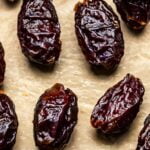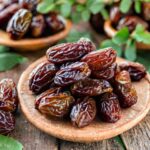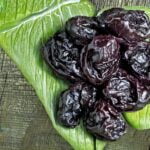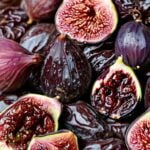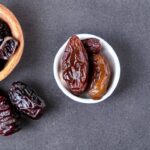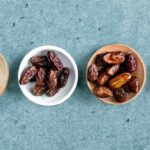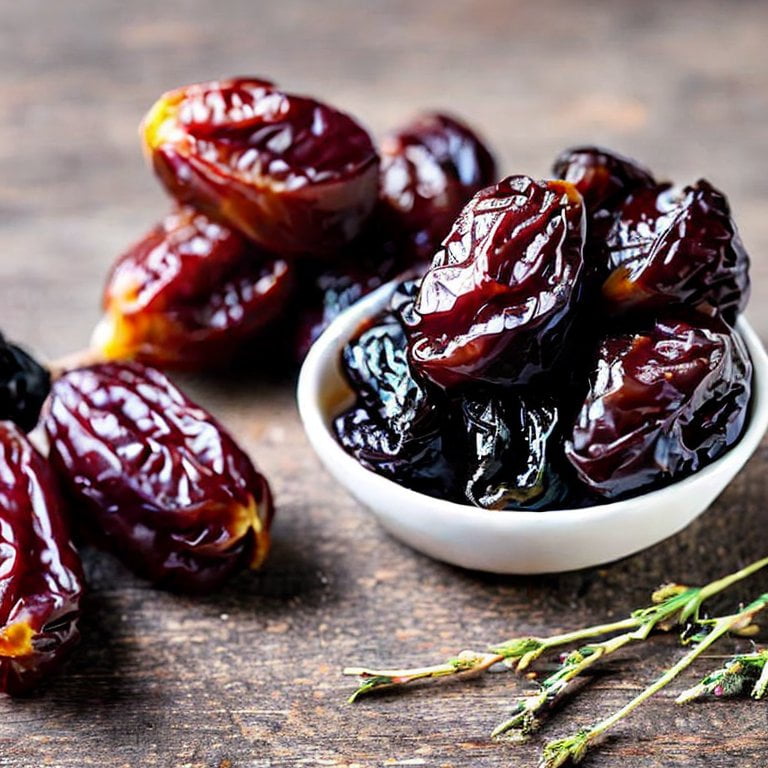
Constipation is a common gastrointestinal problem affecting people of all ages. According to the American Gastroenterological Association, about 42 million Americans suffer from constipation. This condition is characterized by infrequent bowel movements or difficulty in passing stools, which can cause discomfort, pain, and bloating. While there are several causes of constipation, including a low-fiber diet, dehydration, certain medications, and some medical conditions, one of the most effective ways to alleviate it is through dietary changes.
Dates and prunes are two foods commonly recommended for constipation relief. Both fruits are known for their high fiber content, which helps promote regular bowel movements. However, which one is better for constipation relief?
In this post, we’ll explore the benefits of dates and prunes for constipation and help you make an informed decision.
Table of Contents
- Dates for Constipation
- Prunes for Constipation
- Which is Better: Dates or Prunes for Constipation?
- Other Dietary Tips for Constipation Relief
- Final Thoughts
Dates for Constipation
Dates are small, sweet fruits that are widely cultivated in the Middle East, North Africa, and South Asia. They are known for their high nutritional value, containing vitamins, minerals, and fiber. (See also Dates vs Prunes vs Figs)
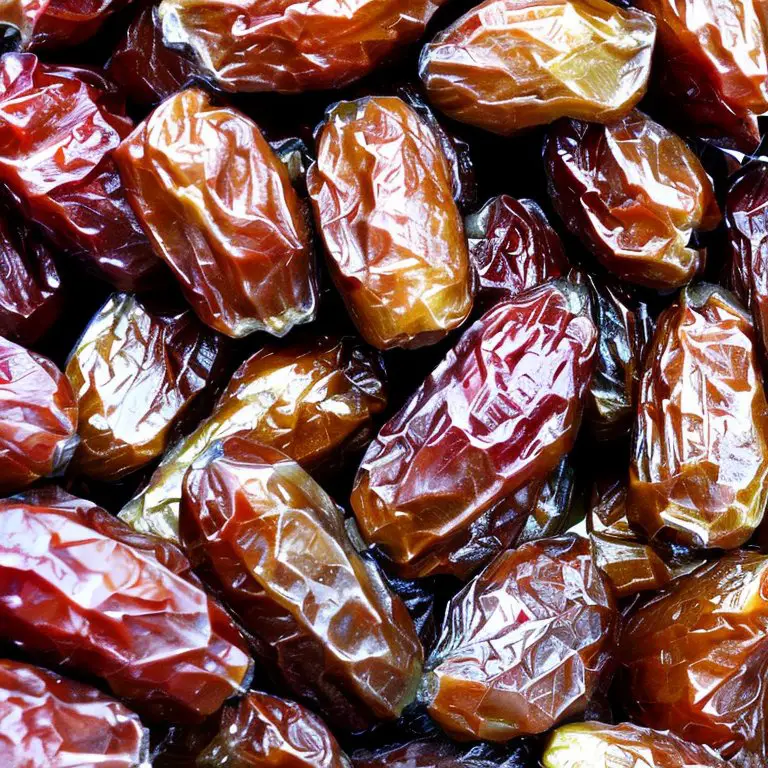
Dates are a good source of soluble fiber, which helps soften stools and makes them easier to pass. They also contain insoluble fiber, which adds bulk to stools and helps move waste through the digestive system.
Dates are also a natural laxative, which means they can stimulate bowel movements and help relieve constipation. They contain sorbitol, a type of sugar alcohol that has a laxative effect on the digestive system. (See Are Dates Good for Constipation?)
Sorbitol helps draw water into the large intestine, which softens stools and makes them easier to pass. However, consuming too much sorbitol can cause diarrhea and abdominal cramping, so it’s important to eat dates in moderation. (See How Many Dates for Constipation?)
In addition to their fiber and laxative properties, dates contain other nutrients that can help promote digestive health. For example, they contain potassium, which helps regulate fluid balance in the body and can help prevent dehydration, a common cause of constipation.
Dates also contain antioxidants, which can help reduce inflammation in the digestive tract and promote healthy digestion.
(For info on how to use dates for constipation, see How to Use Dates for Constipation)
Prunes for Constipation
Prunes, also known as dried plums, are another popular food for constipation relief. Like dates, prunes are a good source of fiber, containing both soluble and insoluble fiber. The fiber in prunes adds bulk to stools and helps move waste through the digestive system. (See related: How Many Prunes To Eat For Constipation?)
However, unlike dates, prunes contain a higher concentration of sorbitol, which makes them a more effective natural laxative.
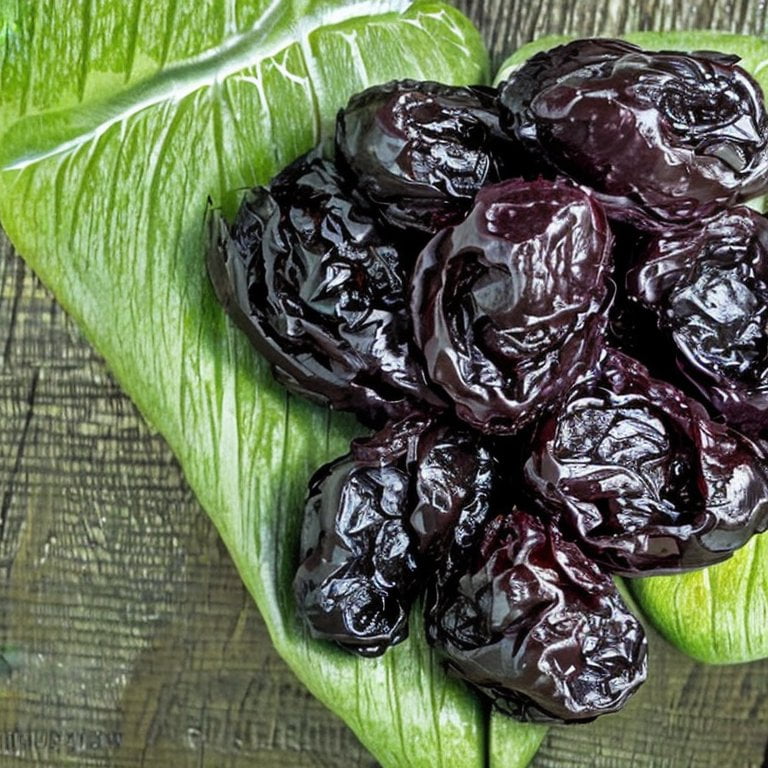
Studies have shown that consuming prunes can help increase bowel movements and relieve constipation. A study published in Alimentary Pharmacology & Therapeutics found that eating prunes helped improve stool frequency and consistency in people with constipation. Another study published in Nutrition Journal found that consuming prunes improved digestive health and reduced constipation symptoms in older adults.
In addition to their fiber and laxative properties, prunes contain other nutrients that can benefit digestive health. They are a good source of vitamin A, which helps maintain healthy mucous membranes in the digestive tract.
Prunes also contain potassium, which helps regulate fluid balance in the body and can prevent dehydration.
Which is Better: Dates or Prunes for Constipation?
Both dates and prunes are good options for constipation relief, as they are both high in fiber and contain natural laxatives. However, prunes may be a more effective natural laxative than dates, as they contain a higher concentration of sorbitol. Sorbitol can help draw water into the large intestine, softening stools and making them easier to pass.
Additionally, prunes have been shown to be more effective than psyllium fiber (a common fiber supplement) in improving stool frequency and consistency in people with constipation. In a study published in Alimentary Pharmacology & Therapeutics, researchers compared the effects of consuming prunes to consuming psyllium fiber on bowel movements and found that prunes were more effective at increasing stool frequency and softening stools.
However, dates can still be beneficial for constipation relief. They contain both soluble and insoluble fiber, which can help add bulk to stools and move waste through the digestive system. Dates also contain sorbitol, although in lower concentrations than prunes, which can help stimulate bowel movements.
When choosing between dates and prunes for constipation relief, it’s important to consider personal preferences and tolerance. While prunes may be more effective at relieving constipation, some people may not enjoy their taste or experience gastrointestinal discomfort from consuming too much sorbitol. In this case, dates may be a better option.
It’s also important to remember that while dates and prunes can help alleviate constipation, they should be consumed in moderation as consuming too much fiber and sorbitol can cause gastrointestinal discomfort, including bloating, gas, and diarrhea.
Other Dietary Tips for Constipation Relief
In addition to consuming dates or prunes, there are several other dietary tips that can help alleviate constipation. Here are a few tips:
Increase fiber intake
Consuming a diet high in fiber can help promote regular bowel movements. Good sources of fiber include fruits, vegetables, whole grains, and legumes.
Stay hydrated
Drinking plenty of water and other fluids can help keep stools soft and easy to pass.
Exercise regularly
Regular physical activity can help promote bowel regularity and prevent constipation.
Limit processed foods
Processed foods are often low in fiber and can contribute to constipation. Limiting processed foods and opting for whole foods can help promote digestive health.
Avoid constipating foods
Certain foods, such as dairy, red meat, and fried foods, can contribute to constipation. Avoiding these foods or consuming them in moderation can help prevent constipation.
Final Thoughts
Both dates and prunes are good options for constipation relief as they are both high in fiber and contain natural laxatives. Prunes may be a more effective natural laxative than dates due to their higher concentration of sorbitol, but personal preferences and tolerance should also be taken into consideration.
It’s also important to remember to consume these foods in moderation and to incorporate other dietary and lifestyle changes to promote digestive health and prevent constipation. If constipation persists, it’s important to consult with a healthcare provider to rule out any underlying medical conditions.
Lance has been passionate about the plant-based diet and we have been following a whole food plant-based diet for over 5 years. We focus on health, natural healing, weight management, animal rights, and the health of the planet and environment by focusing on whole plant-based foods and sustainable practices.
Learn more at the About Me page and follow on social media at the links below.

